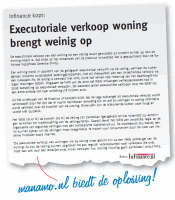
The public auction of a house will yield an average of 37 percent less than the value of the house. This has been investigated by the Erasmus University in a publication of the National Mortgage Guarantee (NHG in Dutch).
A house is publicly sold through an action commissioned by the lender, when the house owner, despite unsolvable payment problems, does not wish to cooperate with a private sale through a broker. Whenever a loan is provided with NHG, the loss is charged to the account of the Guarantee Private Housing (WEW in Dutch). Approximately half of the loss declarations received by the WEW in 2008 were related to public auctions. Annually public auctions damage the WEW for an extra five million euros according to their own estimates.
The research of the Erasmus University shows that the low yield in public auctions is caused by the fact that there are mostly traders present and that insufficient information is provided about the quality of a house at auctions. In addition, the additional costs are often high and not often clear in advance.
The WEW will insist on the modernization of the auction practice with all the parties that are involved with the auction (lenders and the notaries). In addition the WEW is thinking of the national direction of the organization of regional auctions when it comes to a transparent cost structure. The brokerage could play a role to make auctions more accessible to consumers by using modern resources such as the internet.
‘The public auction of houses should be focused on a realistic yield of the house at the auction. That is how the auction could grow into a normal distribution channel where sellers that would want to sell their house quickly, but for a reasonable price, would sell their house voluntarily’, says the NHG.